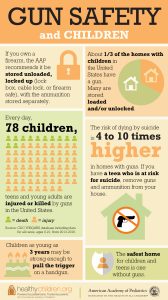Conceal and Carry for Gun Owners
Possible Discussion Questions for Gun Owners:
- Why is owning a gun important to you? How does it make you feel?
- Did you grow up with guns in your household? How do you think that shaped your outlook on them now?
- When were you first taught that owning a gun was a good thing?
- Where did you learn about gun safety? Have you taught your family about gun safety, or do rely on someone else for gun safety training? What steps do you take in your own household to keep everyone safe?
- Are guns an important political issue to you? Have you ever voted for a specific candidate based off of their gun policy?
- There are over 30,000 gun deaths in the United States every year. What, in your view, do you see as a potential solution to reduce that number?
- Take a moment to read this piece by Justin McFarlin, a Black army combat veteran. To what extent does race impact someone’s ability to openly carry a gun safely? What could be done to change it?
Gun Safety:
- Firearm Safety & Training – Pima County
- Civilian Firearms Training – Glendale, Arizona
- Gun Safety – City of Tucson
- Gun Owner Safety Training
- Responsible Gun Ownership
Exercises for Gun Owners:
1. As an exercise, compare U.S. gun regulations to gun regulations in other developed countries. Click on links to read about gun-control laws in detail.
- Germany: To buy a gun, anyone under the age of 25 has to pass a psychiatric evaluation. The Weapons Act bans fully automated firearms.
- Finland: Handgun license applicants are allowed to purchase firearms only if they can prove they are active members of regulated shooting clubs. Before they can get a gun, applicants must pass an aptitude test, submit to a police interview and show they have a proper gun storage unit.
- Italy: To secure a gun permit, one must establish a genuine reason to possess a firearm and pass a background check considering both criminal and mental health records.
- France: Firearms applicants must have no criminal record and pass a background check that considers the reason for the gun purchase and evaluates the criminal, mental and health records of the applicant.
- United Kingdom and Japan: Handguns are illegal for private citizens.
2. As an exercise, compare the responses from other government’s following mass shootings in their countries.
Port Arthur Massacre, Australia 1996, and their Government’s Response:
On April 28-29, 1996, there was a mass shooting in Port Arthur, Tasmania, Australia. The shooting left 35 people dead, and 18 people wounded. Twelve days after the massacre, the Australian prime minister, John Howard, announced a sweeping package of gun reforms in a country where firearms had long been considered an essential prop in the national mythology of life in the bush. Less than a month, later, federal and state legislators crafted the National Firearms Agreement. It created extensive licensing and registration procedures, which included a 28-day waiting period for gun sales. In addition, it banned all fully automatic or semiautomatic weapons, except when potential buyers could provide a valid reason—which did not include self-defense—for owning such a firearm. The federal government also instituted a gun-buyback program, which resulted in the surrender of some 700,000 firearms.
Christchurch Massacre, New Zealand 2019, and their Government’s Response:
On March 25, 2019, Brenton Tarrant, a white supremacist, killed 51 worshippers and injured dozens other at two Christchurch, New Zealand mosques. Within a month, Prime Minister Jacinda Ardern responded by banning semi-automatic weapons and implementing a buyback program for gun owners. In the aftermath of the shooting, New Zealand’s parliament voted 119-1 to pass a bill banning most semi-automatic weapons, as well as parts that allow lower-powered firearms to be modified into higher-powered ones. Prime Minister Jacinda Ardern, has garnered international recognition for her swift response to the shooting.
Please click on this link for more information on Gun Violence, Gun Laws, Resources, and ways to Take Action


